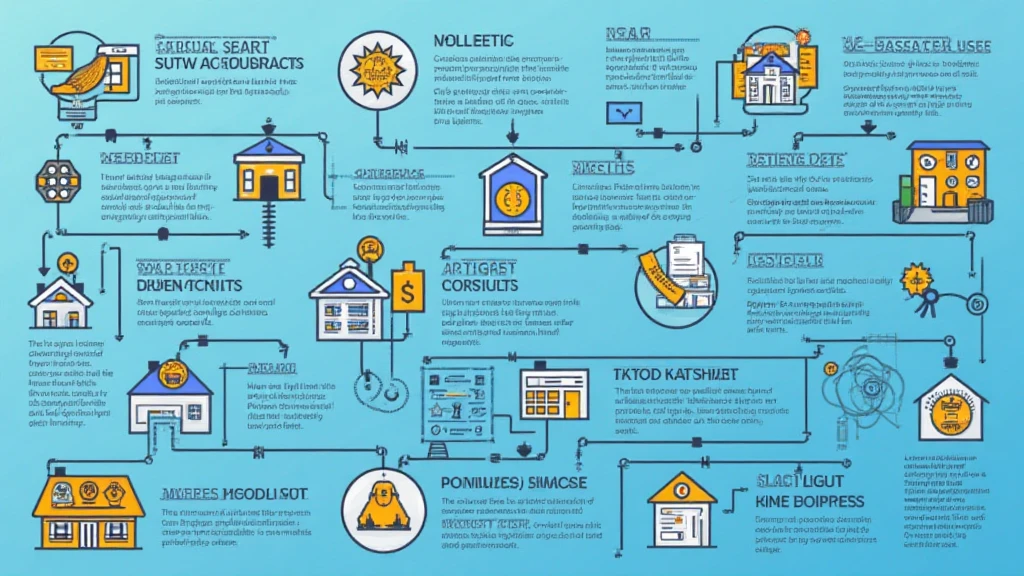Top 10 Crypto Real Estate Use Cases
With a staggering $4.1B lost to DeFi hacks in 2024, many sectors are still grappling with security in digital transactions. However, the real estate industry is rapidly embracing cryptocurrency to enhance security, transparency, and efficiency in transactions. In this article, we will explore the top 10 crypto real estate use cases that are working to revolutionize how properties are bought, sold, and managed.
1. Tokenization of Real Estate Assets
Tokenization allows real estate investors to buy and sell fractional ownership in properties. Traditional real estate investments often require substantial capital upfront, making them less accessible to average investors. By creating digital tokens that represent a share of ownership in a property, tokenization democratizes investing in real estate. This process is seamless and significantly reduces transaction costs.
- Accessibility: Lower minimum investments enable more people to participate.
- Liquidity: Tokens can be traded on various blockchain platforms, enhancing liquidity.
- Efficiency: Smart contracts streamline the transaction process.
2. Enhanced Transparency in Transactions
Blockchain technology is known for its transparency. All transactions recorded on the blockchain are visible to everyone, reducing fraud and providing a clear chain of ownership. This transparency is especially valuable in real estate, where validating property ownership has traditionally been a cumbersome process.

- Trust: Users can verify property history swiftly.
- Reduced Fraud: Immutable records decrease the likelihood of disputes.
3. Smart Contracts for Automated Processes
Smart contracts automate agreements between buyers and sellers, ensuring compliance with predefined conditions. For instance, once an agreed-upon price is paid in cryptocurrency, the smart contract can automatically transfer ownership to the buyer without the need for intermediaries, thereby reducing costs.
- Efficiency: Reduces time spent on legal proceedings.
- Cost-effective: Minimizes the need for real estate agents and attorneys.
4. Cross-border Transactions Simplified
International real estate transactions can be complicated due to varying currencies and financial regulations. Crypto provides a universal medium of exchange, simplifying these processes. Buyers and sellers can transact using cryptocurrencies directly, bypassing forex fees.
- Speed: Faster transactions across different currencies.
- Lower Costs: Avoids high transaction fees associated with currency conversion.
5. Crowdfunding Opportunities via Crypto
Crowdfunding real estate projects using cryptocurrencies helps developers to bypass banks and get funding directly from investors. This not only speeds up the capital-raising process but also opens opportunities for more investors to engage in real estate ventures.
- Diverse Funding: Attracts more investors with less capital.
- Potential Returns: Offers rewards comparable to traditional investments.
6. Verification of Property Titles on Blockchain
Using blockchain for storing property titles ensures that records are tamper-proof and easily accessible. This method helps keep title fraud at bay and allows buyers and sellers to verify ownership with confidence.
- Security: Protects against unauthorized changes to ownership records.
- Traceability: Easy access to historical data regarding properties.
7. Real Estate Marketplaces Powered by Crypto
Various platforms now allow users to list, buy, and sell properties exclusively using cryptocurrencies. This shift is driving more real estate transactions in the digital currency space, offering alternatives to traditional methods.
- Convenience: Users can browse listings and make purchases hassle-free.
- Innovation: Facilitates the entry of digital-native investors into real estate.
8. Fractional Rental Services Using Crypto
Fractional rental models allow renters to invest in rental properties using cryptocurrencies. By simply paying their rent in tokens, renters can earn a stake in the property they live in, creating an innovative way to generate passive income.
- Long-term Investment: Offers renters a pathway to ownership.
- Recurring Revenue: Property owners benefit from steady rental income while also building equity.
9. Enhanced Security through Blockchain Tech
The reliance on blockchain technology in real estate enhances security measures for transactions and property management. Transactions are encrypted and recorded on a decentralized ledger, making it virtually impossible for fraudsters to manipulate data.
- Trustworthiness: Reduces risks associated with transaction fraud and data breaches.
- Accountability: Every transaction is recorded, creating a robust audit trail.
10. Sustainable Real Estate Options Using Cryptocurrency
Several blockchain projects focus on promoting sustainable real estate initiatives by tokenizing environmentally friendly properties and projects. Funds raised through cryptocurrency can be used to develop green buildings, benefiting both the planet and the investors.
- Environmental Impact: Encourages development of sustainable communities.
- Innovation: Attracts eco-conscious investors to the market.
In conclusion, as the world moves toward digital currencies and blockchain technology, the top 10 crypto real estate use cases hold the potential to revolutionize the industry. Vietnam, with its growing user base of 300% year-over-year in crypto adoption, highlights the need for adaptation in real estate. Engaging with these innovations could pave the way for more accessible and transparent processes in the near future. Always consult local expert advice before making investments—these insights are here to guide you, not act as specific financial advice.
For the latest updates on the intersection of cryptocurrency and real estate, check out cryptobestnews.



